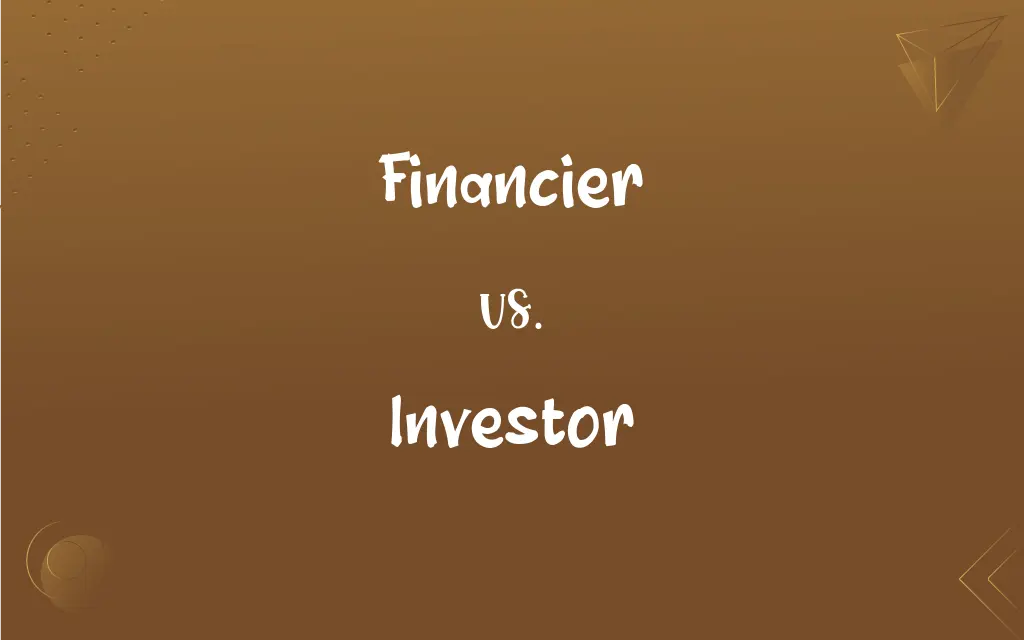Financier vs. Investor: What's the Difference?
Edited by Aimie Carlson || By Janet White || Published on December 27, 2023
A financier provides or manages large sums of money, often for large projects or enterprises, while an investor allocates capital with the expectation of a future financial return.

Key Differences
A financier is typically associated with the management and allocation of large pools of money, often for significant projects or business ventures. In contrast, an investor is someone who commits capital to an endeavor or asset, expecting to earn a financial return, which can range from small personal investments to large-scale funding.
Financiers often work within financial institutions or in roles that involve complex financial structuring and management. They are skilled in leveraging financial instruments for maximum benefit. On the other hand, an investor can be an individual or entity placing capital into investment vehicles such as stocks, bonds, real estate, or startups, seeking profitable returns.
The role of a financier is usually more hands-on in managing and orchestrating financial operations, strategies, and structures. Conversely, an investor's involvement varies, from passive roles, such as stock market investments, to active roles, like angel investors in startups.
Financiers often cater to high-capital demands, such as funding corporations or large-scale projects, focusing on the mechanics and strategies of funding. Investors, however, focus on the potential for growth and profit of their investments, whether it's in a business, a piece of real estate, or a financial instrument.
Both financiers and investors deal with capital allocation, financiers often assume a more intricate role in managing and strategizing financial operations, whereas investors are primarily concerned with the growth and return on their capital investments.
ADVERTISEMENT
Comparison Chart
Focus
Manages and orchestrates large financial operations
Allocates capital for potential returns
Role
Often institutional, involved in complex financing structures
Can be individual or institutional, with varying levels of involvement
Scale
Typically deals with larger sums of money
Investment scale can vary widely
Objective
Focused on the mechanics and strategies of funding
Focused on earning returns from investments
Examples
Funding corporations, managing large projects
Stock market investments, real estate, startups
ADVERTISEMENT
Financier and Investor Definitions
Financier
A financier is a person involved in large scale money management and investment.
The financier arranged significant funding for the new infrastructure project.
Investor
An investor is an individual or entity investing in various opportunities for gains.
The investor carefully analyzed the market trends before making his move.
Financier
A financier specializes in handling and allocating funds for enterprises or projects.
The city's development plan relied heavily on the expertise of a renowned financier.
Investor
An investor is someone who allocates capital to assets expecting a future financial return.
The investor saw great potential in the startup and decided to fund it.
Financier
A financier often works with large monetary transactions and financial strategies.
As a seasoned financier, she played a key role in the company's merger.
Investor
An investor commits funds to endeavors, aiming for long-term growth and profit.
The young investor focused on high-risk, high-reward opportunities.
Financier
A financier is known for structuring and managing financial investments and deals.
The financier successfully navigated the complex financial landscape to secure the deal.
Investor
An investor puts money into financial ventures, stocks, or property for profit.
As an investor, she diversified her portfolio to include both stocks and real estate.
Financier
A financier is a professional who deals with significant financial operations and funding.
He became a respected financier after his successful management of several high-profile investments.
Investor
An investor strategically places capital in different areas for potential returns.
Being a savvy investor, he identified a lucrative opportunity in renewable energy.
Financier
One that engages in investing or raising large amounts of money.
Investor
To commit (money or capital) in order to gain a financial return
Invested their savings in stocks and bonds.
Financier
A person who, as a profession, profits from large financial transactions.
Investor
To spend or devote for future advantage or benefit
Invested much time and energy in getting a good education.
FAQs
Are financiers always involved in large projects?
Typically, yes, financiers are involved in large-scale financial operations and projects.
Can a financier also be an investor?
Yes, a financier can also be an investor if they personally allocate capital for future returns.
What is a financier?
A financier manages and allocates large sums of money, often in corporate or project financing.
What types of investments do investors typically make?
Investors can invest in stocks, bonds, real estate, startups, and other financial vehicles.
How do investors decide where to invest?
Investors decide based on market analysis, risk assessment, and potential for returns.
Do financiers need special qualifications?
Yes, financiers usually require financial education and expertise in handling large sums of money.
Do financiers work independently or for institutions?
Financiers can work either independently or as part of financial institutions.
Do financiers play a role in the economy?
Yes, financiers play a significant role in the economy by managing and allocating funds for various projects and enterprises.
What does an investor do?
An investor allocates capital to various assets with the expectation of future financial returns.
What is the main difference between a financier and an investor?
The main difference lies in their roles; a financier focuses on managing large financial operations, while an investor is focused on allocating capital for potential returns.
Do financiers invest their own money?
Financiers may invest their own money, but they primarily handle others' finances.
Can anyone become an investor?
Yes, anyone with capital to allocate can become an investor, regardless of the amount.
Can investors influence the companies they invest in?
Yes, especially large investors can influence company decisions and policies.
Can investing be a full-time job?
Yes, for some individuals, investing can be a full-time profession, especially for those managing large portfolios.
What skills are important for a financier?
Skills in financial management, analysis, and strategic planning are crucial for a financier.
Are financiers involved in personal finance?
Financiers typically deal with larger-scale finance rather than personal finance.
Is investing always profitable?
No, investing carries risks, and not all investments yield profits.
What is the risk level for investors?
The risk level varies depending on the type of investment and market conditions.
How do investors make money?
Investors make money through dividends, interest, and capital gains.
What impact do financiers have on businesses?
Financiers can significantly impact businesses by providing necessary funding and financial strategies.
About Author
Written by
Janet WhiteJanet White has been an esteemed writer and blogger for Difference Wiki. Holding a Master's degree in Science and Medical Journalism from the prestigious Boston University, she has consistently demonstrated her expertise and passion for her field. When she's not immersed in her work, Janet relishes her time exercising, delving into a good book, and cherishing moments with friends and family.
Edited by
Aimie CarlsonAimie Carlson, holding a master's degree in English literature, is a fervent English language enthusiast. She lends her writing talents to Difference Wiki, a prominent website that specializes in comparisons, offering readers insightful analyses that both captivate and inform.































































